- Home
-
Overview
- Study Guide
- The Single Most Important Idea
- Mission Statement
- War Is Not Inevitable keynote speech
- Capstone Essay: "To Abolish War"
- An Action Plan
- The Nine Cornerstones
- How Far We Have Already Come
- The Secret Ingredient
- The Vision Thing
- How Long It Will Take
- What You Can Do
- The AFWW Logo Explained
- Examples of War Expenses
- Biological Differences
- What Makes People Happy
- Map of Non-warring Cultures
- Cornerstones
- Videos
- Books
- Blog
- Project Enduring Peace
- About
- Related Projects
- Contact
|
Global Women Leaders Flex Security Muscles in New York City Judith Hand  Jumeirah Essex House Hotel Jumeirah Essex House Hotel On November 15-17 of 2007, over seventy five women—current and former heads of state, influential ministers, and leaders of inter-governmental and non-governmental organizations—were invited to the first International Women Leaders Global Security Summit at the Jumeirah Essex House Hotel in New York City. This may prove to be a pivotal historic event. The stated goal was to provide women leaders a forum to discuss, evaluate, and endorse meaningful strategies for global security. For reasons explained in two books and on this website, the creation and maintenance of social stability is a priority of special importance to women, and we have arrived at a moment in history where many women have sufficient influence and power to begin to address security issues with authority. (Hand 2003, Women, Power and the Biology of Peace; 2018 War and Sex and Human Destiny) Perhaps we have reached an historical "tipping point."
1 Comment
Recently, in an exchange with talk show host Barry F. Seidman (Equal Time for Freethought; WBAI-NY), who describes himself as a secular humanist, the subject of paradigm shift came up. The host is an advocate of libertarian-socialism (anarchism), a good man who envisions a future for our species much like that envisioned by AFWW: egalitarian, just, less violent, ecologically sustainable, and free of war. He sees us trapped in endless cycles of war, polluting and denuding our environment at a perilous rate, and challenged by the juggernaut of global warming. In other words, like most well-read and broadly-informed people, he sees the mess we've gotten ourselves into. When questioned by me about whether or not he used his voice, via his radio program and interviews with experts, to encourage the global empowerment of women as rapidly as possible in order to achieve his vision, his response was, No. "Unless we change the current capitalist system, adding more women to government won't make any difference." Ah, I thought, this very enlightened man of good will, like most men, women, well-meaning organizations, and governments, has it the wrong way 'round. Let me explain. Maybe you agree with him. Maybe you also feel that to fix what's wrong with us, other issues command first priority. You may agree with him that the crucial focus is to change "the system," and then there will be time to get more women involved. 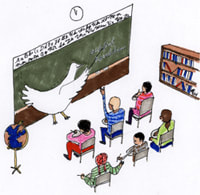 Or perhaps you feel the place to start is by teaching people, young and old, one person at a time, how to resolve their conflicts nonviolently, how to live in peace as a daily practice. When we do that, the assumption seems to be, men everywhere, even those in the Muslim world, will then peacefully accept women as equals and will embrace women as full partners, in our homes, governments, and in global decision-making. 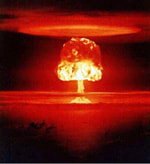 Or maybe you feel that paradigm shift necessitates tackling the war industry head-on, ending the use of land mines, cluster bombs, and nuclear weapons—and working forward from there. Or maybe your focus is on ending poverty. Or spreading the enlightenment and freedom that comes with liberal democracy. In other words, you too may think that empowering women is a good thing, but something that can wait until after we fix the really important problem/s, after we fix the really big barriers to positive change in human history. To Date, Nonviolence Movements Were"Before Their Time." Now They Are Poised to Change History9/16/2019 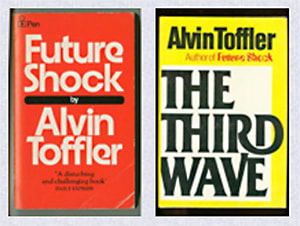 THE TIMES, THEY ARE A CHANGING Agricultural Revolution. Industrial Revolution. Digital Revolution/ Information Age. Massive alterations in outlook and behavior have accompanied each of these profound shifts in human culture. No writer has come close to the masterful chronicling of the pell-mell morphing of our time to be found in two classic works written in the late 1900s by Alvin and Heidi Toffler: Future Shock and The Third Wave. Both books still make fascinating and highly instructive reading. It's likely in moments of reflection you feel an uncomfortable stirring, a tightening sense of unease and uncertainty in your chest. Change tends to disturb us. And if anything, the speed of change so brilliantly limned by the Toffler's seems to continue its breathtaking acceleration. We are creating, with every day that passes, the very different future in which we and our children will live. These astonishing changes are propelled by myriad social pressures and technological inventions. It's not a question of whether we'll experience a massive cultural upheaval—a "great turning," a "paradigm shift," a cultural transformation. Right now we are, in fact, experiencing a huge one. The question is whether the change will be mostly violent or mostly peaceful and where will we end up. 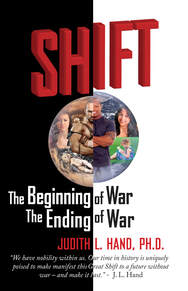 By Judith Hand. There are myriad reasons—psychological, proximate, and ultimate (biological)—for why we make war. We’ve indulged in this deeply embedded, very bad cultural habit for a very long time, so skeptics are on solid ground to believe that ending it may not be, most likely isn’t, possible. But in Shift: The Beginning of War, The Ending of War I explore how we CAN end war, if we choose to. No biological barrier prevents us from breaking this habit; as with all bad habits, including one as deeply engrained as war, breaking free is a matter of will. Once we resolve to act, two kinds of efforts will be required for success, admittedly more simply said than done. We must:
|
Follow Me on Facebook
If you'd like to read my take on current affairs, or get a sense of what amuses me or I find educational or beautiful, do a search and follow me, Judith Hand, on Facebook. About the AuthorDr. Judith L. Hand. Dr. Hand earned her Ph.D. in biology from UCLA. Her studies included animal behavior and primatology. After completing a Smithsonian Post-doctoral Fellowship at the National Zoo in Washington, D.C., she returned to UCLA as a research associate and lecturer. Her undergraduate major was in cultural anthropology. She worked as a technician in neurophysiology laboratories at UCLA and the Max Planck Institute, in Munich, Germany. As a student of animal communication, she is the author of several books and scientific papers on the subject of social conflict resolution.
Categories
All
Archives
November 2019
|
A Future Without War
Believe in it. Envision it. Work for it.
And we will achieve it.
Believe in it. Envision it. Work for it.
And we will achieve it.
AFWW is continually developed and maintained by Writer and Evolutionary Biologist Dr. Judith Hand.
Earth image courtesy of the Image Science & Analysis Laboratory, NASA Johnson Space Center. Photo Number AS17-148-22727 eol.jsc.nasa.gov
©2005-2019 A Future Without War. All rights reserved. Login
Earth image courtesy of the Image Science & Analysis Laboratory, NASA Johnson Space Center. Photo Number AS17-148-22727 eol.jsc.nasa.gov
©2005-2019 A Future Without War. All rights reserved. Login
- Home
-
Overview
- Study Guide
- The Single Most Important Idea
- Mission Statement
- War Is Not Inevitable keynote speech
- Capstone Essay: "To Abolish War"
- An Action Plan
- The Nine Cornerstones
- How Far We Have Already Come
- The Secret Ingredient
- The Vision Thing
- How Long It Will Take
- What You Can Do
- The AFWW Logo Explained
- Examples of War Expenses
- Biological Differences
- What Makes People Happy
- Map of Non-warring Cultures
- Cornerstones
- Videos
- Books
- Blog
- Project Enduring Peace
- About
- Related Projects
- Contact


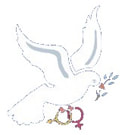
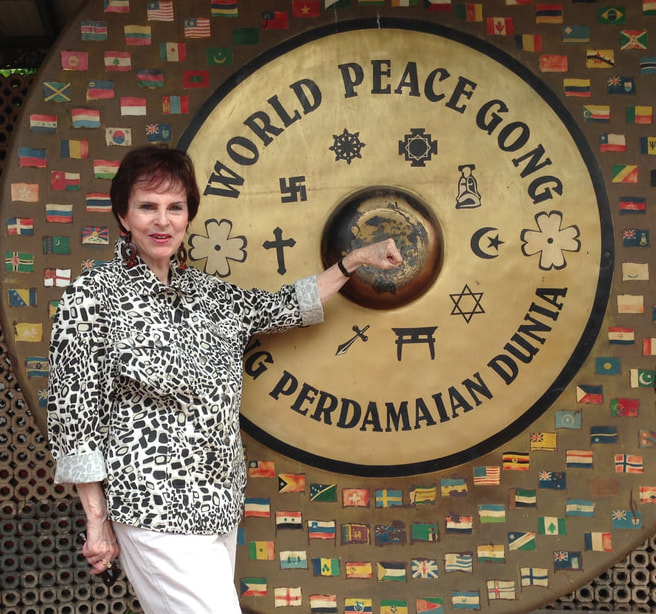
 RSS Feed
RSS Feed